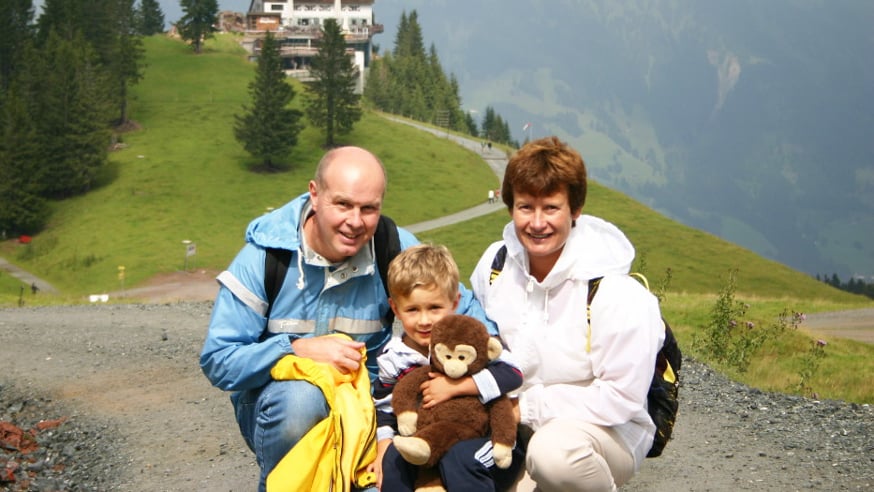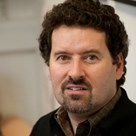
Image: Kevin, Christopher and Karen Capel.
All children with cancer should have the genetic profile of their tumour comprehensively analysed when being considered for new treatments, say leading childhood cancer experts.
Leading scientists and doctors are calling for a major upscaling in genetic sequencing for children with cancer, to understand patients’ disease better and help direct them to clinical trials that could offer more precise treatment.
They also believe this genetic information could help drive the discovery of new targeted treatments for childhood cancers.
NHS England plans to introduce an NHS Genomic Medicine Service shortly to begin putting in place the resources and infrastructure to expand access to sequencing.
Experts at The Institute of Cancer Research, London, and The Royal Marsden NHS Foundation Trust are urging the NHS to take this huge opportunity to dramatically scale up access to genetic sequencing for children so that doctors routinely carry out sequencing in children at all stages in their treatment, and especially at relapse.
They are calling for new funding and changes in clinical practice to turn the promise of the NHS Genomic Medicine Service into reality. Their call is being timed for Children’s Cancer Awareness Month, to maximise the chances that governments across the UK will listen.
Support our Childhood Cancer appeal to help us develop new treatments for children with aggressive and hard to treat cancers.
Find out more
1,800 UK children diagnosed with cancer each year
The molecular profile of a child’s tumour, which includes genetic information about the cancer, is currently only assessed in sufficient detail at diagnosis at a few specialist paediatric centres in the UK and, till very recently, very rarely sufficiently studied at relapse. The situation is better in some other parts of Europe and the US.
Around 1,800 children (aged 14 or under) are diagnosed with cancer in the UK each year. Childhood cancer survival has plateaued and an insufficient number of the new targeted drugs that attack cancer-causing genes have been made available for testing in children.
The experts believe that genetic sequencing and other detailed molecular profiling could help direct children to trials of existing targeted treatments that might prove effective.
They also argue that if we are to drive further advances in children’s cancer that can improve survival, it is essential to begin routinely profiling tumours so that specific molecular targets can be identified and ultimately the right drugs administered.
Molecular profiling is vital for discovering and developing new targeted treatments and introducing the most effective of these as early as possible.
Sequencing is less likely to direct treatment at diagnosis, where conventional therapy is often effective, but after relapse it is absolutely critical to open up access to potentially life-saving targeted therapy where those relevant targets exist in paediatric cancers.
Researchers will need better access to tumour tissue
Scientists at The Institute of Cancer Research (ICR) and paediatric oncologists at The Royal Marsden argue that it is important to obtain genetic information at relapse even if it has already been obtained at diagnosis, because many tumours evolve and become more aggressive and resistant to treatment over time, and new mutations may arise.
The major barrier to starting a widespread molecular profiling programme, which could help children get more personalised treatment, is funding to deliver molecular profiling effectively – including for major laboratory infrastructure and trained molecular pathologists to analyse samples.
Researchers will need better access to tumour tissue. This requires practice change among clinicians, who until recently did not have enough options in terms of targeted treatments to warrant taking biopsies to search for a targetable weakness.
There is a clear sea change now, with clinicians and parents very willing for these biopsies to be done if they open options for new treatments.
A programme of molecular profiling of children’s tumours at diagnosis and relapse is being driven forward at the ICR and The Royal Marsden NHS Foundation Trust, with funding from the charities Children with Cancer UK and Cancer Research UK, through the Stratified Medicine Paediatrics (SMPaeds) initiative.
This testing is very broad and involves sequencing RNA, the whole exome, and tumour DNA that is circulating in the blood.
The ICR is an internationally leading research centre in the study of childhood cancers and cancers in children, teenagers and young adults.
Find out more
Implementing genetic test
Together with the Centre for Molecular Pathology at The Royal Marsden, Professor Louis Chesler has implemented a genetic test for cancer genes in children’s tumours with the support of charity Christopher’s Smile and the NIHR.
At the ICR, a research institute and charity, Professor Chesler is leading a team which aims to use this now clinically accredited test, and to develop other tests, to rapidly sequence the molecular profile of all children with a solid tumour at The Royal Marsden, looking for cancer-causing genetic mutations.
Professor Chesler is determined to expand the programme as widely as possible across the UK through the SMPaeds initiative, which is co-led with Great Ormond Street Hospital.
The Oak Paediatric and Adolescent Oncology Drug Development Team at The Royal Marsden, led by Dr Lynley Marshall and generously supported by Oak Foundation for more than 10 years, conduct innovative clinical trials of drugs discovered by the ICR, and of drugs initially developed for adult cancers, to help find new treatments for hard-to-treat childhood cancers.
Increasing the number of clinical trials available is key to the team’s ambition to offer children the same opportunities for personalised cancer treatment as adults have. Combined with advanced molecular testing, targeted molecular medicines maximise the chance of successful treatment and avoid the use of more toxic chemotherapies.
Molecular profiling 'incredibly useful'
Professor Louis Chesler, Professor of Paediatric Solid Tumour Therapeutics at The Institute of Cancer Research, London, and Consultant in Paediatric Oncology at The Royal Marsden NHS Foundation Trust, said:
“Molecular profiling of children’s cancers will be incredibly useful when it comes to finding new treatments. We may be able to increase the chance of a child responding to treatment by looking for genetic changes in their tumour that can be targeted using existing drugs.
“If no drugs exist, this will highlight areas for future scientific discovery, which is what drives the development of new, more effective treatments.

“We urgently need to ensure that the infrastructure is in place to analyse all these samples and to return useful information to clinicians that can guide treatment.”
Professor Louis Chesler, Paediatric Solid Tumour Therapeutics Team
Professor Paul Workman, Chief Executive of The Institute of Cancer Research, London, said:
“We’ve had tremendous success in discovering targeted treatments for adult cancers but we’ve not seen the same progress for children. Improved access to the genetic information locked in children’s tumours will make all the difference in discovering new drugs for childhood cancer.
“And it can give some children, through clinical trials, access to existing cutting-edge targeted drugs – offering them treatments that may be more effective and with fewer side-effects than standard therapy.”
'Essential every child has their tumour sequenced'
Kevin and Karen Capel set up the charity Christopher’s Smile in 2008 after their son Christopher died of a brain tumour just nine days before his sixth birthday.
As well as being dedicated fundraisers for childhood cancer research, they have been tireless campaigners for better access to clinical trials and, more recently, to get molecular profiling of childhood cancer made available across the NHS.
Earlier this year, the charity worked in partnership with NICE to publish advice, in the form of a medtech innovation briefing, on the use of genetic sequencing for children with cancer.
Karen Capel, co-founder and trustee of UK children’s cancer charity, Christopher’s Smile, said:
“When Christopher died, there wasn’t any genetic information available to his doctors. Now we have the technology and the expertise, it’s essential that every child has their tumour sequenced at diagnosis and relapse.
“We need this information to power the research to find new and better treatments, and to ensure every child is getting the best available treatment option for them.”